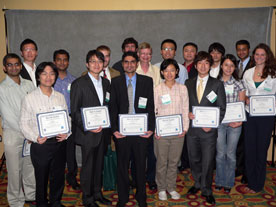 Seventeen students received Best in Session Awards at TECHCON 2010, presented by Dr. Michael Mayberry, Intel, SRC Board of Directors Member (second row center)
Seventeen students received Best in Session Awards at TECHCON 2010, presented by Dr. Michael Mayberry, Intel, SRC Board of Directors Member (second row center)TECHCON 2010 Best in Session Awards
 Seventeen students received Best in Session Awards at TECHCON 2010, presented by Dr. Michael Mayberry, Intel, SRC Board of Directors Member (second row center)
Seventeen students received Best in Session Awards at TECHCON 2010, presented by Dr. Michael Mayberry, Intel, SRC Board of Directors Member (second row center)Paper presentations were judged within sessions with a Best in Session Award made in each session. Representatives from member companies served as judges, using a standard set of criteria and considering both paper presentation and poster. Sessions included papers from FCRP, GRC, and NRI students with 15 GRC, 1 FCRP, and 1 NRI students winning Best in Session Awards. The following papers were judged Best in Session:
(titles were taken from the origninal abstract submission.)
| Session 1 - Test and Testability | ||||
|---|---|---|---|---|
| 1.6 | GRC | XiaoXiao Wang Univ. of Connecticut |
Low-Cost On-Chip Structures for Measuring NBTI Effects, Variations, Path Delay, and Noise Abstract / Presentation |
|
| Session 2 - Analog I/O and mm-Wave Circuit Design | ||||
| 2.5 | GRC | Shuqing (Victor) Cao Stanford University |
ESD and High-Speed I/O Driver Characterization and Co-Design Methodology Abstract / Presentation |
|
| Session 3 - Nanoengineered Materials | ||||
| 3.9 | GRC | Masahiro Hori niversity Waseda University |
Improving Single Dopant Detection Efficiency by Controlling Substrate Bias in Single Ion Implantation Method Abstract / Presentation |
|
| Session 4 - Memory and Analog Technologies | ||||
| 4.6 | GRC | Taehun Lee Univ. of Texas/Dallas |
High Thermal Conductivity SOI Substrates for Mixed-Signal Application Abstract / Presentation |
|
| Session 5 - Verification | ||||
| 5.5 | GRC | Bryan A. Brady Univ. of California/Berkeley |
Low-Power Verification with Term-Level Abstraction Abstract / Presentation |
|
| Session 6 - Multi-Core and Parallel System Design | ||||
| 6.7 | GRC | Karthik Ganesan Univ. of Texas/Austin |
System-level Max Power (SYMPO) - A Systematic Approach for Escalating System-Level Power Consumption using Synthetic Benchmarks Abstract / Presentation |
|
| Session 7 - Cu/Low k Extendability | ||||
| 7.7 | GRC | K.J. Ganesh Univ. of Texas/Austin |
Automated Local Texture and Stress Analysis in Cu Interconnects using D-STEM and Precession Microscopy Abstract / Presentation |
|
| Session 8 - Patterning Materials and Systems | ||||
| 8.3 | GRC | Marie Krysak Cornell University |
PAG and Base-Attached Molecular Glass Resists for Improved Lithographic Performance Abstract / Presentation |
|
| Session 9 - Environment, Safety, and Health | ||||
| 9.3 | GRC | Jeffrey Rottman Intel Foundation/SRCEA Fellow Univ. of Arizona |
Fate of CMP Nanoparticles in Municipal Wastewater Treatment Abstract / Presentation |
|
| Session 10 - Digital Circuits and Systems Design (10A) and 3D Design Techniques and Tools (10B) | ||||
| 10.6 | GRC | Tao Zhang Pennsylvania State University |
A 5-layer 3D Stacked Chip Prototyping for H.264 Application Abstract / Presentation |
|
| Session 11 - Packaging | ||||
| 11.3 | GRC | Yiwei Wang Univ. of Texas/Austin |
The Impact of Cu Pillar Bumps on the Thermomechanical Reliability and Chip-Package Interaction of Flip Chip Packages with Ultra-low k Interconnects Abstract / Presentation |
|
| Session 12 - Si, Ge and III-V Advanced Technologies | ||||
| 12.3 | GRC | Krishna Iyengar Cornell University |
Modeling Temperature and Stress Profiles in 3D during Sub-millisecond Laser Spike Annealing Abstract / Presentation |
|
| Session 13 - Logic/Physical Design | ||||
| 13.8 | FCRP | Zohaib Mahmood Mass. Institute of Technology |
System Level Modeling and Simulation of Analog Circuits Using Semidefinite Programming Based Compact Modeling Techniques Abstract / Presentation |
|
| Session 14 - Data Converter Design | ||||
| 14.9 | GRC | Jikai Chen University Univ. of Florida |
A 50mW 2.5GS/s 5-Bit ADC in 0.13um CMOS with Background Calibration for In-Situ TDR Measurements Abstract / Presentation |
|
| Session 15 - 3D and Beyond Cu/Low k | ||||
| 15.5 | GRC | Hyung Suk Yang Georgia Institute of Technology |
Marriage of CMOS and MEMS using Flexible Interconnects and TSVs Abstract / Presentation |
|
| Session 16 - Nano-Scale and Magnetic Devices | ||||
| 16.3 | NRI | Seyoung Kim Univ. of Texas/Austin |
Coulomb Drag in Independently-Contacted Graphene Bilayers Abstract / Presentation |
|


